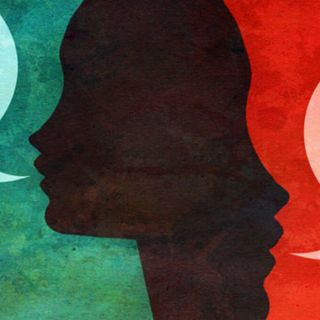
Why People Are Suckers for a Good Conspiracy Theory
Everything from bad childhood experiences to certain personality traits to poor digital literacy leaves some people more likely to buy into wild ideas than others.

Google ‘moon landing conspiracy theory’ and you’ll get 31,60,000 results. That’s roughly 3,00,000 more than than the number of results for ‘heart disease treatment,’ heart disease being the leading cause of death globally. Which speaks to the popularity and appeal of conspiracy theories; we, the human race, love them — perhaps even more than we love life.
“The reality is, the internet has made it possible for people to say whatever the hell they like to a broader number of people than ever before,” Roger Launius, a former chief historian of NASA, told The Guardian at the time of the moon landing’s 50th anniversary in 2019. “And the truth is, Americans love conspiracy theories. Every time something big happens, somebody has a counter-explanation.”
You don’t have to be an American to love conspiracy theories, of course — take the deeply held (but false) belief that Subas Chandra Bose never died in a 1945 plane crash over Taiwan, but lived out his days peacefully as a sadhu — or, less peacefully, in a gulag in the Soviet Union, or serving in the Chinese Army — with sightings regularly reported well into the ’80s. Or the conspiracy theory that Indira Gandhi kickstarted India’s nuclear program by orchestrating a CIA mission that implanted a nuclear-powered spying device to monitor China on top of the Nanda Devi peak — then stealing the device left there.
Research offers a bewildering array of explanations as to why we fall for conspiracy theories. A 2018 study found people who have anxious attachment styles — characterized by relationship insecurity and clinginess and likely established by a negative experience with a caregiver in the first years of life — are more likely to believe in conspiracy theories.
“These people exaggerate threats compared to others,” Karen Douglas, PhD, the study’s author and a professor of psychology at the University of Kent, told the BBC at the time. “They help people explain or justify their anxieties.”
Related on The Swaddle:
Measles Cases Up 50% Last Year Due to Anti‑Vax Misinformation, WHO Warns
Other studies echo this, suggesting people are vulnerable to the guidance of conspiracy theories when they feel anxious or out of control. Perhaps that’s why so many conspiracy theories revolve around the threatening — events of violence, like terrorist attacks and genocide, or phenomena, like unusual lights in the night sky. It also might explain why other conspiracy theories surface and gain popularity despite years of widespread acceptance of the truthful explanation. It doesn’t seem coincidental that the anti-vaxx movement — founded on the conspiracy theory that vaccines cause autism and most popular among women — emerged around the same time as conversations began about medical sexism and women’s feelings of dismissal and condescension from the very people meant to care for them and their families.
“When the outcome of an event is significant, momentous, or profound in some way, we are inclined to think it must have been caused by something correspondingly significant, momentous, or profound,” Rob Brotherton, PhD, author of Suspicious Minds: Why We Believe Conspiracy Theories, told Popular Mechanics. “Simply, we reckon big things have big causes.”
Still, individual personality plays a large role in what we’re willing to believe. Other research suggests a constellation of personality traits known as schizotypy (no relation to schizophrenia) pushes some people toward belief in a conspiracy.
“These people tend to be more suspicious, untrusting, eccentric, needing to feel special, with a tendency to regard the world as an inherently dangerous place,” Josh Hart, PhD, an associate professor of psychology at Union College in the U.S. and the author of a 2018 study, said in a statement at the time. “They are also more likely to detect meaningful patterns where they might not exist. People who are reluctant to believe in conspiracy theories tend to have the opposite qualities.”
Other conspiracy theory proponents have personalities “intolerant of uncertainty” concluded yet another study, leaving them literally “addicted to answers” in order to find closure.
And of course, the environment one finds oneself in matters, too. We live in an age of online propaganda machines cranking out fake news on a minute-to-minute basis; one 2017 study found low levels of digital literacy predicted belief in conspiracy theories.
Still, our belief in alternative explanations has remained remarkably constant over time. One study of 120 years’ worth of letters to the editors of The New York Times and the Chicago Tribune found no change in conspiracy theory beliefs over time. While the time span studied stopped at 2010, more recent polling suggests belief in conspiracy theories has remained relatively constant since, Liberty Vittert, PhD, a data scientist at the Washington University in St Louis, writes for The Conversation.
Ultimately, this constancy may not be a bad thing. On some level, we’re all vulnerable to a good conspiracy theory — and it may just be the thing keeping the human race going.
“We descended from primates that tended to notice dangerous, hidden things, like a predator in the grass,” Michael Shermer, PhD, of Chapman University, and the author of Why People Believe Weird Things and The Believing Brain, told Popular Mechanics. “Our ancestors were the paranoid ones who assumed the worst and survived.”
Liesl Goecker is The Swaddle's managing editor.
Related


Apple, Google, and Amazon Are Integrating Their Smart Home Devices. Should We Care?
